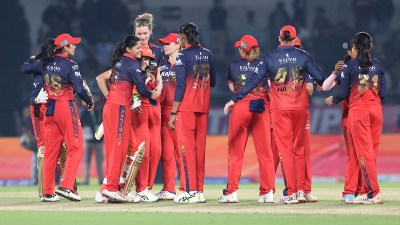Wide Angle
A verse for GhalibIn the mindless excitement for the millennium, some worthwhile ideas have been overlooked. For instance, I do not see ev...

A verse for Ghalib
In the mindless excitement for the millennium, some worthwhile ideas have been overlooked. For instance, I do not see evidence of Urdu poetry being accorded any profile in the course of the millennial celebrations which will last from the year 2000 to 2001.
The millennium is a large canvas of 1000 years. Against this vast civilisational backdrop, Urdu poetry, with its history of about 200 years, is only a strand. Let us not forget, poets like Kalidasa are outside the pale because they precede the millennium which is about to end; it just gives us an idea of our civilisational depth.
An excellent project to be taken up for the millennium is research and compilation of all the poetry composed, recited, sung in various parts and languages of India over the past 1000 years. Remember, only a society which preserves its cultural assets will actually profit from that inevitability called globalisation.
There are two possible images in which globalisation can be perceived: ajuggernaut which will bulldoze local cultures into submission; or a series of pendants of varied hues and shapes strung together into a necklace. The second image presupposes that the pendants will retain their core value.
I sometimes worry whether Ghalib will survive globalisation. Or Shakespeare, for that matter. I imagine, in geological time, they will survive rather as Homer, Sophocles or Kalidasa have survived 8211; as part of our classical heritage to be studied by future scholars.
But there is such institutional support for Shakespeare in Britain, for instance, that rampaging philistinism has not be-en able to put him aside. His birthplace in Stratford upon Avon is one of the world8217;s mo-st popular tourist attractions. Every season, ever-new productions of his plays are at the heart of West End theatre. In fact there is institutional support for Shakespeare in all English speaking countries. Not many people outside the tight circle of Shakespeare fanatics know Delhi8217;s very own Prof. Rupin Desai8217;smonumental efforts in keeping scholarly interest riveted on just one play, Hamlet. In fact quot;Hamlet studiesquot; is an entire branch of inquiry flourishing under Prof. Desai8217;s guidance.
I would like some such effort to be undertaken for Kalidasa, Rabindranath Tagore and Nazrul Islam, in fact all our regional poets we in the metro-politan centres are ignorant of. Substantial effort in this direction will equip us with the self assurance that will be required to cope with the challenges of globalisation.
Since Atal Behari Vajpayee has also received considerable attention as an occasional poet, we shall be perfectly justified in suggesting to him that major and sustained interest should be taken to invest seriously in all that falls in the domain of Saraswati. It is an essential precondition for India to be respected in the next millennium as the super power of knowledge, as the Prime Minister suggests.
The reason I worry on this count is because I am uncertain of the new elite we have created in a zone ofcultural aridity. This somewhat superficial, westward inclined elite is all too easily swept off its feet by the allurements of globalisation.
What are we doing about Ghalib in the new millennium which, let us face it, will have its first century preoccupied with the pros and cons of globalisation?
The good news is that the government at the centre and the state is well on the way to acquiring Ghalib8217;s house in Ballimaram in old Delhi. Thought has to be given as to how this literary pilgrimage centre is to be utilised.
Poet Sardar Jafri had an excellent proposal. Names of Urdu poets are generally followed by the names of places where they lived. Jigar Moradabadi, Firaq Gorakhpuri, Josh Malihabadai, Sahir Ludhianvi are some of the names that come to mind. Plaques with their photographs and brief biographical sketches can be mounted at the relevant railway stations. Since all these poets were part of the literary scene since independence, recordings of their own recitations are available. Better still, wecan have well known singers set their verses to Indian ragas.
Poets in various parts and languages of India can be likewise identified and rendered to music. Nothing binds India in one civilisational unit like its folk and classical music. Verses of various Indian poets, including Urdu and Hindi, rendered uniformly to selected set of ragas! What exquisite continuity across the length and breadth of this land!
The ideas can be refined through discussion. The ball is in the court of the Prime Minister, Mamta Bannerjee and Digvijay Singh, who has shown some enthusiasm on the concepts.
- 01
- 02
- 03
- 04
- 05































